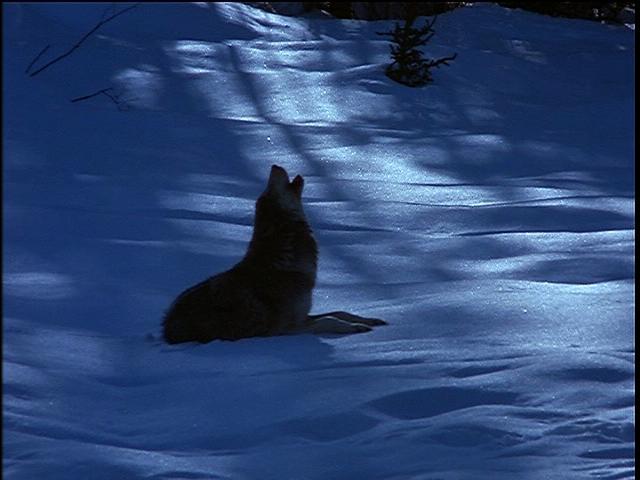Wolf Moon, Snow Moon, Hunger Moon

Second full moon after the winter solstice: Wolf Moon, Snow Moon, Hunger Moon. Photo: White Wolf, Creative Commons, some rights reserved
Full moon tonight, specifically, the second full moon after the winter solstice. As my EarthSky email reminds me, each full moon has traditional names, poetic names, actually. This moon has the harshest of the lot: Wolf Moon, Snow Moon, Hunger Moon. No one seems to know who the poet was–Anonymous, no doubt. He or she got a lot of publication credit back in the day.
Folks under the threat of blizzard downstate tonight will probably not see the Wolf Moon, but they can be forgiven for wondering who to throw off the back of the troika to appease the looming wolf pack.
Martha and Todd were talking about maybe getting in a little moonlit night skiing yesterday. They were probably thinking Snow Moon, rather than Wolf Moon. But moonlit skiing is a good way to turn lemons into lemonade. Of course lemonade can also be consumed while wrapped in a blanket beside the fire.
One of my favorite haiku involves the moon, and making lemonade from life’s lemons:
Barn’s burnt down —
now
I can see the moon.
Masahide was a samurai and they invented the stiff upper lip long before the British, but I imagine he was looking at the Hunger Moon. If I got to name the full moons, I’d call this one Barnburner Moon, in his honor.
Who gets to name things has been in the news this week, too. The Weather Channel has taken to naming every extreme weather event that comes down the pike. They are calling the current East Coast storm Winter Storm Jonas. NPR has decided to draw a line in the sand and unlike many news outlets will not be using the Weather Channel appellations. They also issued a memo about avoiding weather cliches like “snowpocalypse,” and “hunker down.” And the mythical Jack Frost?–also to be eschewed.
Whatever words you use to describe the stuff up in or falling from the sky, have a barnburner of a week.
Tags: listeningpost








Thanks for an in formative article with a humorous twist. This is the kind of Stuff I enjoy reading. The second line of the haiku is a couple of syllables short!? But thanks for trying, Ilse
Hi Ilse. Thanks for the kind comment on my post. Actually, Masahide’s haiku is perfectly formed–in Japanese characters. Using the 5-7-5 syllable structure in English for haiku in translations or in original English haiku is just an attempt to approximate the 5-7-5 character structure used in the Japanese written form. It is entirely optional and can often result is a distorted translation in English.
Dale Hobson, NCPR
Thanks for the “issued a memo” link – great insight into Standards and Practices of NPR reporting.
Well said!